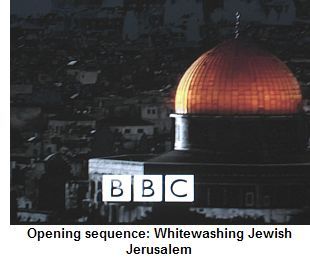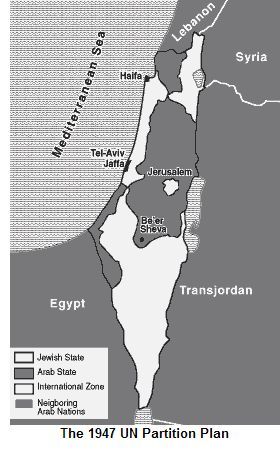 The events leading up to the creation of the modern-day State of Israel exactly 60 years ago have been examined and re-examined by qualified historians. So why was Jeremy Bowen given the responsibility of producing the BBC’s one-hour documentary “The Birth of Israel” broadcast on May 4, 2008? (Available to view online only in the UK. This program, may, however, be broadcast internationally at a future date.)
The events leading up to the creation of the modern-day State of Israel exactly 60 years ago have been examined and re-examined by qualified historians. So why was Jeremy Bowen given the responsibility of producing the BBC’s one-hour documentary “The Birth of Israel” broadcast on May 4, 2008? (Available to view online only in the UK. This program, may, however, be broadcast internationally at a future date.)
Middle East editor Bowen has consistently demonstrated a slanted view of Israel and the regional conflict and his documentary continues in this vein.
A taste of things to come arrives in the first few seconds of the broadcast, which features images of Islam’s Dome of the Rock and a Christian crucifix against a Jerusalem backdrop. Despite the deep religious connection of Judaism to both Jerusalem and the land of Israel, this image is, incredibly, omitted. And herein lies the major flaw of the entire program – the legitimate roots of the Jewish people in the Land of Israel going back three millenia are either downplayed, delegitmized or ignored altogether.
- Whitewashing Jewish rights to a state:
While Bowen talks about Palestinian farmers working the land for centuries, scant attention is paid to the continuous Jewish presence dating back to antiquity, instead implying that the waves of Jewish immigrants arriving in the pre-state years were an alien implant.
Nowhere does Bowen explain that a Palestinian sovereign state had never existed and that prior to partition, Palestinian Arabs did not view themselves as having a separate identity. In fact, Bowen ignores some 100,000 Arabs who emigrated from neighboring countries during the British Mandate period alone and are today considered Palestinians.
Bowen simplistically sums up Britain’s 1917 Balfour Declaration: “One nation promising the land of another to a third,” conveniently omitting that the land of another was not the reality and that the third nation [the Jewish people] had legitimate and just claims to that land.
As if to hammer home his point, Bowen also says that the Holocaust created a new moral argument for a Jewish state. Is Bowen implying that there was no moral case before the Nazi genocide? While the Holocaust undoubtedly proved the urgent need for a Jewish state, it in no way should minimize legitimate Jewish claims to a state of their own prior to the destruction of European Jewry.
Despite this, one interviewee states: “Why should the Palestinians who had not heard of it pay the price of the Holocaust? … Why displace the Palestinian people to pay a price for a crime which they had not committed?” While Bowen briefly mentions the Mufti of Jerusalem’s wartime sojourn in Nazi Germany with Hitler, he fails to mention the Palestinian leader’s support for Hitler and his participation in the killing of Jews in wartime Europe.
- Moral equivalency:
 Bowen employs the typical BBC stance of moral equivalency in describing the current conflict: “Israel uses airstrikes and ground incursions. Palestinians rocket Israeli border towns. Both sides blame each other.” Thus, Palestinian terrorism is equated with Israeli efforts to defend her citizens.
Bowen employs the typical BBC stance of moral equivalency in describing the current conflict: “Israel uses airstrikes and ground incursions. Palestinians rocket Israeli border towns. Both sides blame each other.” Thus, Palestinian terrorism is equated with Israeli efforts to defend her citizens.
- Palestinian and Arab victimhood:
Bowen, however, moves away from this equivalency, instead taking every opportunity to portray an Arab David as the victim of the Israeli Goliath. Yet, despite a history of aggression against the Jews – including riots in the 1920s and 1936 and the infamous 1929 Hebron Massacre – the Arabs are painted as victims of Jewish power and malevolence.
Bowen ignores the fact that Israel was attacked by five Arab armies immediately after declaring its independence. Instead he is at pains to stress the numerical and organizational superiority of Israel’s army in order to perpetuate his concept of Arab victimhood. While historians have accepted that the Arabs were ill-prepared to win a war, this should not gloss over the fact that it was those same Arab forces who launched an aggressive war that they eventually lost. Bowen should also not have played down the very real sacrifice and hardships endured by the fledgling Israeli state which lost some 1% of its population during her War of Independence.
- Impartial on Partition:
 Referring to the partition of Mandatory Palestine, Bowen claims: “The Jews got the best of it – more than half the country, even though they owned around 10% of the land and there were twice as many Arabs.”
Referring to the partition of Mandatory Palestine, Bowen claims: “The Jews got the best of it – more than half the country, even though they owned around 10% of the land and there were twice as many Arabs.”
Bowen selectively quotes historical facts to yet again portray the Arabs as victims. In fact, the boundaries were based solely on demographics and approximately 60% of the Jewish state was to be the desert in the Negev while the Arabs occupied most of the agricultural land.
In addition, according to British statistics, more than 70% of the land in what would become Israel was not owned by Arab farmers, it belonged to the mandatory government. Those lands reverted to Israeli control after the departure of the British. Nearly 9% of the land was owned by Jews and about 3% by Arabs who became citizens of Israel. That means only about 18% belonged to Arabs who left the country before and after the Arab invasion of Israel.
- Massacre of the truth:
Jewish attacks on Arabs are played up by Bowen and given much detail, with claims of “massacres” against Palestinians featuring prominently in the program, while Arab attacks on Jews are seen in far more abstract terms.
Bowen gives much airtime to the story of Deir Yassin, but fails to discuss the context behind the incident or the politicization and conflicting accounts of what really happened. For it was certainly not the intention of Israeli forces to carry out a “massacre” of non-combatants in what was actually a fierce battle, as residents of Deir Yassin and foreign forces opened fire on the Israelis.
Bowen goes on to quote an Israeli Haganah intelligence officer at the time who makes claims of terrible atrocities carried out by the Irgun and Lehi forces in Deir Yassin. However, that very same source has been called into question by Israeli histo
rian Dr. Uri Milstein who believes that this was produced for political reasons to discredit the Irgun and Lehi and prevent their absorption into regular Jewish forces.
Interestingly, Bowen relies on the “eyewitness” account of Hazzem Nusseibeh a Palestinian journalist at the time, who in a previous BBC documentary actually admitted that he had been told to exaggerate claims of Jewish atrocities at Deir Yassin in order to encourage Arab armies to come to the aid of the Palestinian Arabs (it had the opposite effect, causing Arabs to flee their homes). Nusseibeh, however, does not repeat this assertion in Bowen’s documentary, which relies on a secondary source instead.
- “Ethnic Cleansing”:
Bowen also plays loose with the historical interpretation of Plan D, citing the charge that this Israeli military operation was intended to “ethnically cleanse” the Arab population. While acknowledging that there is a debate amongst some historians on the issue, he prejudices this by claiming that the “Jews went on the offensive”.
This, despite the mainstream historical view, backed up by prominent historian of this period Benny Morris who maintains that there was no Zionist “plan” or blanket policy of evicting the Arab population, or of “ethnic cleansing”. Plan Dalet of March 10, 1948, was the master plan of the Haganah – the Jewish military force that became the Israel Defense Forces – to counter the expected pan-Arab assault on the emergent Jewish state.
Bowen also takes the liberty of claiming that “Jewish leaders had discussed moving Arabs out for years”, without offering any historical sources or background context. In any event, no Israeli government has ever adopted or carried out this policy.
- “Expansionist”:
Bowen concludes by focusing on the charge that Israel is continuing policies of “expansionism”. This, despite Israel’s withdrawal from Gaza in 2005 and continuing efforts to achieve peace and Israel’s stated policy of bringing about a Palestinian state.
This is but a selection of issues concerning Jeremy Bowen’s documentary. We are sorry that those of you outside the UK are currently unable to view this program on the BBC’s website. Please, however, send your considered comments to the BBC Complaints website, particularly if you have seen this program already.

